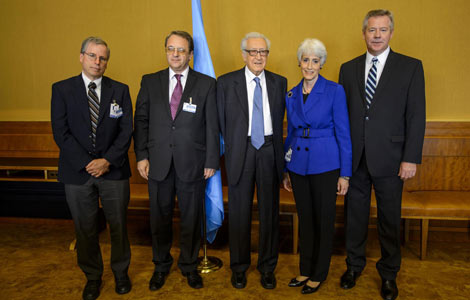Obama targets global warning, emissions
Updated: 2013-06-26 07:13
(Agencies)
|
||||||||
|
 |
|
U.S. President Barack Obama wipes his forehead as he speaks about his vision to reduce carbon pollution while preparing the country for the impacts of climate change while at Georgetown University in Washington, June 25, 2013. [Photo/Agencies] |
Obama ordered his administration to end the practice of coal-fired power plants dumping unlimited carbon dioxide emissions into the atmosphere, moving to deliver on one of his major goals in office. He announced the first-ever federal regulations on heat-trapping gases emitted by new and existing power plants.
The president also said an oil pipeline project from Canadian tar sands to Texas refineries should only be approved if it doesn't "significantly exacerbate" carbon pollution. Environmental activists have demanded that his administration not approve the Keystone XL pipeline, while Canada's leaders have pushed for its approval.
"I refuse to condemn your generation and future generations to a planet that's beyond fixing," Obama told students at Georgetown University in Washington.
Environmentalists took heart in the remarks, noting it was the first time the administration had directly linked approval of the pipeline to its effect on pollution.
Republican critics in Congress called his plan a job-killer that would threaten the economic recovery. Obama dismissed the critics, saying, "That's what they said every time. And every time, they've been wrong."
Tuesday's announcement was the first public confirmation that Obama plans to extend proposed carbon emissions controls on new power plants to existing ones. Forty percent of US carbon dioxide emissions, and one-third of greenhouse gases overall, come from electric power plants, according to the federal Energy Information Administration.
Other parts of Obama's plan will boost renewable energy production on federal lands, increase efficiency standards and prepare communities to deal with higher temperatures.
Obama raised climate change as a key second-term issue in his inaugural address in January, and in his State of the Union policy speech in February, he issued an ultimatum: "If Congress won't act soon to protect future generations, I will."
But US public opinion on climate change has proven a barrier to addressing the issue. Four in 10 people in the US say global warming poses a major threat to the country, the Pew Research Center said in a polling report Monday - with "Americans among the least concerned about this issue of the 39 publics surveyed".
Obama has pledged to work with major polluting countries to curb emissions, building on an agreement he struck recently with China's leader to phase out hydrofluorocarbons, potent greenhouse gases used in air conditioners and refrigerators. He has also called for an end to US support for public financing for new coal-fired plants overseas, with exemptions in the poorest nations as long as the cleanest technology available in those countries is being used.
Sidestepping Congress by using the executive power of his office does not guarantee Obama an easy path ahead. Lawmakers could introduce legislation to thwart his efforts, and the rules for existing power plants will almost certainly face legal challenges.
Tom Kuhn, president of the Edison Electric Institute, a group that represents power companies, said the industry will consider whether new climate change policies and regulations "mesh" with its ongoing transition to a cleaner generating fleet and an enhanced electric grid.
By expanding permitting on public lands, the president said he hopes the country can generate enough electricity from renewable energy projects such as wind and solar to power the equivalent of 6 million homes by 2020, effectively doubling the electric capacity federal lands now produce, senior administration officials said.
Another component of Obama's proposal will involve increasing hydropower production from existing dams.
Environmental groups offered a mix of praise and wariness that Obama would follow through on his ambitious goals. Bill Snape of the Center for Biological Diversity described it as too little, too late.
"What he's proposing isn't big enough, doesn't move fast enough, to match the terrifying magnitude of the climate crisis," Snape said.

 S African worries about Mandela's condition
S African worries about Mandela's condition
 Looted relics to return home this week
Looted relics to return home this week
 Astronauts go out of Shenzhou X's return capsule
Astronauts go out of Shenzhou X's return capsule
 Djokovic, Williams, and China's Li win openers
Djokovic, Williams, and China's Li win openers
 Russia, US disagree plan for Syria talks
Russia, US disagree plan for Syria talks
 Cooling off, the traditional way
Cooling off, the traditional way
 Surviving climber safe at home
Surviving climber safe at home
 Warning on college majors
Warning on college majors
Most Viewed
Editor's Picks

|

|

|

|

|

|
Today's Top News
4 Chinese killed in Papua New Guinea
US-China agree to boost corporate transparency
Global rating firm to rival 'Big Three'
New canal a lifeline for energy
China, EU hold human rights dialogue
Shenzhou X spacecraft mission a success
Riots in Xinjiang kill 27
Americans struggle over smartphones on vacation
US Weekly

|

|







